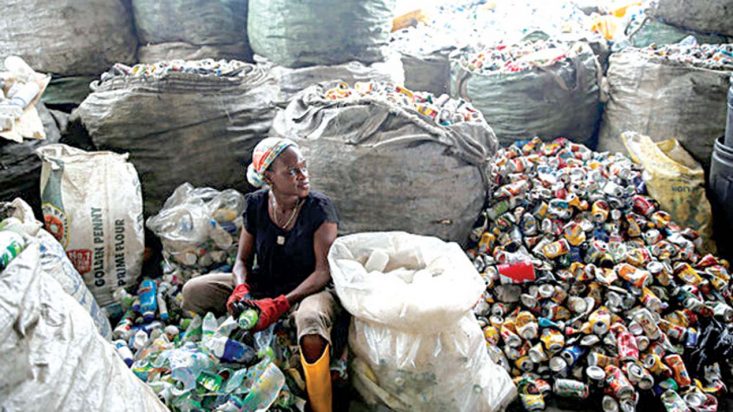
Sustaining Nigerian Economy Through Waste Management – By Sir Jude Ejiogu
The idea of waste management is a huge struggle for people living in the society. This situation has appeared to be a lucrative venture for people scavenging plastic rubber and cans for recycling in the metropolis.
Today, the society is designed that whatever one buys is a product of refined waste, such products come in plastic bags, can drinks, aluminum and other relevant wares. It is very clear that no typical city dweller could buy anything in the market or mall without been package in plastic bags, nylon or cans.
Once all these goods are bought and packaged in at least three plastic bags, on arrival at home, the buyer finishes eating, drinks sachet water and with no dustbin around, he is likely to throw the bags away with or without any little knowledge of wealth creation.
Recently, a report revealed that between 2, 000 and 2,500 tonnes of solid waste are generated on daily basis. In some developed countries, more than half of that plastic waste is collected by private waste management companies and paid by government for recycling. But forty (40) percent of the plastic that is between 3000 and 5000 tonnes every day remain uncollected in various states of the federation according to report. The waste piles along the roads and market places continue to grow until somebody comes and burn them.
To a responsive government, plastic waste means money. The government delegates functions to individuals who collect waste on daily basis and transforms such into refined products for wealth creation. A man who sees waste as wealth beams with smiles when he sees plastic waste scattered all over the place, because he knows how to make a living from “abandoned” wares.
To some private waste scavengers, with gloves and pointed stick, they turn plastic waste into money. The target of every curious wealth creator, be it government or individual is to collect and load waste without allowing it to cause epidemic before its evacuation.
Traditionally, all the different kinds of waste that are collected by private companies in Accra, Ghana are just dumped at landfill sites at Mallam, Oblogo, Achimota or Madina, which all have reached and exceeded their maximum capacity. That’s where waste management used to end. But in 2012, the international waste management company Zoomlion started to collect and buy plastic waste from individuals to avoid sickness.
According to a report in Ghana, “Any waste recovered is taken to the recently built Accra Compost and Recycling Plant (ACARP) at Adjen Kotoku. There, the plastic materials go through a process of recycling. When you look at the sort of waste that comes here, you begin to ask yourself: had it not been for the plant, where would they have dumped it?”
In a large waste recycling plant, plastic waste is sorted, washed, shred into pieces and passed through a cooler machine. The end product is plastic pellets that are packaged in bags to be sold as raw material. Who could imagine what the country will gain from waste management if the necessary logistics are put in place.
Producers of rubber materials such as sachet water bags and plastic chairs buy the pellets in large quantities; rubber producing companies buy more than five hundred bags of pellets from the recycling plant every month. The business has been fruitful, with the company investing on monthly basis for plastic pellets for production of commodities like plastic chairs, bottles and water sachets.
Nigeria’s sprawling megacity, Lagos, with a population of 21m or so, disgorges 10,000 metric tonnes of waste a day. Overburdened municipal governments are reckoned to collect barely 40% of this rubbish. Only 13% of recyclable materials are salvaged from the city’s landfills, according to Wecyclers, a young company keen to promote recycling and reduce waste.
The Lagos State Waste Management Authority is trying to turn rubbish into energy by harnessing methane gas emitted from rotting waste at Olushosun, the largest landfill in Lagos. When completed in five years’ time, the project is supposed to produce 25MW of electricity. That is a help for a country that produces only 3-4GW per year, a tenth of South Africa’s output for a population triple the size.
In the metropolis of Kaduna, 200km (124 miles) north of Abuja, waste collection is currently free for the 1.5m inhabitants. But the state government is trying to get people to pay a monthly levy to reduce the burden on the authorities and to tempt in the private sector.
It wants to award contracts to companies to collect waste from paying customers. Persuading people to pay for rubbish collection will depend on the quality of the service or on the penalty for not co-operating.
As with most Nigerian government contracts, politics and palm-greasing will probably play a part. Still, if more rubbish is collected, people may not complain. Cheers!






